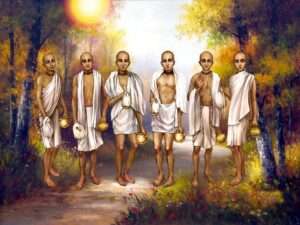 The six Gosvamis of Vrindavana
The six Gosvamis of Vrindavana
Those who have already entered the history of Gaudiya Vaisnavism know that in the early sixteenth century the Gosvamis were sent by Caitanya Mahaprabhu to Vrindavana, with the task of finding the places that, 4,500 years ago, had seen the transcendental pastimes of Krishna and His pure devotees. Over time, vestiges of these holy places had been lost, which it was important to rediscover and return to their original splendor. Lord Caitanya also asked them to write books on bhakti.
Many were the great and pure devotees who resided in Vraja, but the most important were six: Rupa, Sanatana, Raghunatha Dasa, Gopala Bhatta, Raghunatha Bhatta and Jiva. Their contribution to the spread of Vaishnavism-Gaudiya is extraordinary, so much so that we ourselves, who belong to the Krishna consciousness movement, also like to call ourselves “Rupanuga”, descendants of Rupa Gosvami.
Among the six, Jiva Gosvami was the youngest and was also the last to arrive in Vrindavana. This is why we do not find his name in the early biographies of Mahaprabhu. What little is known about him we have learned from Bhakti-ratnakara, written by Narahari Cakravarti and Prema-vilasa, compiled by Nityananda Dasa, a disciple of Srimati Jahnava Devi, wife of Nityananda Prabhu.
Precisely because of the scarce information we have about this character, over time many doubts have arisen among historians. The first refers to the exact year of his birth. Some reveal their perplexity about the fact that Jiva could have been born in 1513, given that we ourselves have just given it as the most probable year. In the Bhakti-ratnakara it is said that Sri Jiva was in Ramakeli when his father and uncles met Lord Caitanya. It was the year 1514, therefore the Gosvami Maharaja should have been only one year old.
Nothing strange so far.
Problems arise when we read a sentence from the work just quoted that describes Jiva Gosvami listening to Lord Caitanya’s words, immediately learning their essence. In light of this, it is reasonable to make two assumptions: either that date is approximate, or Sri Jiva was a child of miraculous abilities. The second hypothesis should not be ruled out since, according to the Scriptures, the Gosvami was the incarnation of a gopi, Vilasa-manjari, and therefore was not an ordinary man. Our tradition brings us other equally extraordinary circumstances, as in the cases of Prahlada and Sukadeva Gosvami, who learned philosophy from their teachers while still in their mothers’ wombs.
This is a section of the book “Tattva Sandarbha”, in English.
To buy the complete book, click here



Leave a Reply